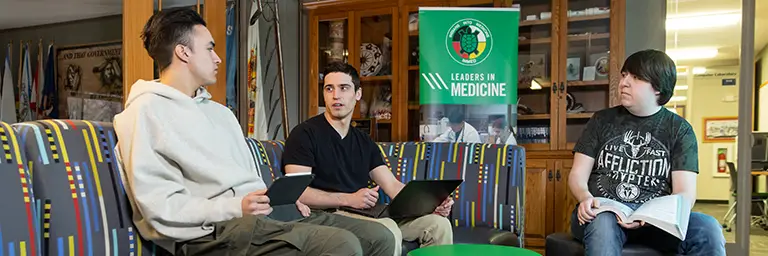Native Health & The Humanities Certificate
Explore Indigenous health issues informed through history, culture, art and literature.
Earn your Native Health & The Humanities certificate and improve healthcare diversity, equity and inclusion. Learn through the lens of history and culture, while honing your research, analysis and communication skills in the health humanities field.
- Program type:
- Certificates/Programs - Undergraduate
- Format:
- On Campus
- Est. time to complete:
- 1 - 2 years
- Credit hours:
- 12
Why earn a certificate in Native Health & The Humanities?
Native Health & The Humanities at UND
-
Conduct a research project, participate in field trips and activities outside of the program and conduct an interview with an Indigenous health worker as part of your coursework.
-
Benefit from the proximity of INMED, Indigenous Health Ph.D. and RAIN programs offered at UND.
-
Have access to guest speakers and Native-health-oriented campus events.
What can I do with a Native Health & The Humanities certificate?
There is a widespread demand for health workers and this certificate will speak to your qualifications for work in Indigenous communities, the Indian Health Service in states such as North Dakota with higher Indigenous populations and urban centers of Indigenous populations such as Minneapolis-St. Paul.
You'll be qualified for jobs such as:
- Community Health Worker: As a community health worker you could serve as a liaison between healthcare providers and the Indigenous community, helping to facilitate access to healthcare services, providing health education and advocating for the needs of the community.
- Health Educator: As a health educator you could work to promote wellness and disease prevention within Indigenous communities. With a focus on Native health and humanities, you may develop and implement culturally relevant health education programs and resources.
- Research Coordinator: You could work as a research coordinator for projects focused on Native health and humanities, assisting with study design, data collection and community engagement.
- Nonprofit Program Coordinator: Many nonprofit organizations focus on improving health outcomes and addressing social determinants of health within Native communities. As a program coordinator, you could help develop and implement programs that address these issues.
- Medical Interpreter/Translator: If you are proficient in a Native American language, you could work as a medical interpreter or translator, helping to bridge the language barrier between local healthcare providers and Native American patients.
- Healthcare Administrator: With additional training or education, you could pursue a career in healthcare administration, focusing on the management of healthcare facilities or programs that serve Native American populations.
- Public Health Educator: Public health educators work to promote and protect the health of populations. With a focus on Native health and humanities, you could work on initiatives aimed at addressing health disparities and improving access to healthcare services for indigenous communities. You may consider UND's bachelor's degree in Public Health Education if you are interested in this career path.
- Community Organizer: As a community organizer, you could work to mobilize Indigenous community members around health-related issues, advocate for policy changes, and facilitate partnerships between community organizations and healthcare providers.
